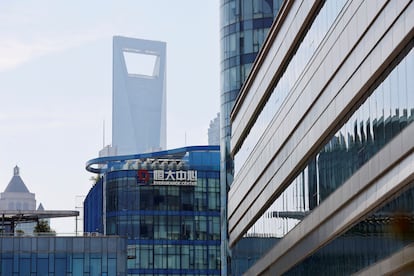Chinese real estate giant Evergrande files for bankruptcy in the United States
The developer is seeking to protect its assets from seizure by creditors as it tries to move forward with its restructuring plan


The crisis at Chinese real estate giant Evergrande entered a new phase Thursday when the company filed a bankruptcy declaration before a New York court: Chapter 15 bankruptcy, which is reserved for international receiverships in the United States. The group has been in financial trouble for several years and has implemented a restructuring plan but is still unable to meet its liabilities.
The suspension of payments comes after the company decided to delay meetings with some debtholders in order to secure more time to move forward with its restructuring plan. Last March the Chinese conglomerate announced a first restructuring plan for its foreign debt, estimated at 140 billion yuan (some $19 billion). In total, the developer had debts of around $340 billion at the end of 2022.
In April, however, the company revealed that it still did not have a sufficient level of creditor support to implement the plan. In July, it received court approval to hold votes on the deal. Meetings with creditors are scheduled for later this month. The bankruptcy filing allows the company to protect its assets from seizure by creditors as it tries to move forward with its restructuring plan, but now under court intervention.
The issues affecting what was once China’s largest housing developer are a reflection of the real estate crisis that has rocked the country. Evergrande took on debt to grow, but when sales slowed and financial conditions tightened it found itself with huge liabilities that posed a systemic threat to the Chinese economy.
State support and negotiations to deal with its financial problems have allowed Evergrande to buy some time and limit the impact, which has threatened to hit the financial sector. The company began to suffer problems in 2019 and these deepened the following year when the Chinese government made it difficult for it to access the financing with which it had generated a huge burden of debt.
Evergrande spiraled into a permanent state of crisis in December 2021, when it defaulted for the first time on a dollar bond payment after months of uncertainty about its finances. Over the course of the same year, the company lost 90% of its value on the Hong Kong Stock Exchange, where it has been suspended from trading since early 2022.
The developer published its 2021 and 2022 accounts last month after a considerable delay, posting losses of an aggregate 581.211 billion yuan ($78.8 billion). Evergrande suffered losses of 476.095 billion yuan ($64.5 billion) in 2021 and 105.116 billion yuan ($33.8 billion) in 2022. The company’s huge losses were caused by land returns, property write-downs, asset losses and finance costs. Despite declaring these huge red numbers, auditors remain wary of its accounts.
The difficulties of the country’s largest developer triggered concerns among analysts and investors about China’s real estate sector. Since the sector’s debt crisis erupted in mid-2021, companies accounting for 40% of Chinese home sales have defaulted, most of them private real estate developers. Concern over the sector remains acute, posing one of the main threats to the Chinese economy. The latest blow is the crisis at Country Garden, one of the largest developers in the country, which admitted this month that it had been unable to pay interest on two debt issues and that it is experiencing “liquidity pressures” due to a “deteriorating sales and refinancing environment.”
Sign up for our weekly newsletter to get more English-language news coverage from EL PAÍS USA Edition
Tu suscripción se está usando en otro dispositivo
¿Quieres añadir otro usuario a tu suscripción?
Si continúas leyendo en este dispositivo, no se podrá leer en el otro.
FlechaTu suscripción se está usando en otro dispositivo y solo puedes acceder a EL PAÍS desde un dispositivo a la vez.
Si quieres compartir tu cuenta, cambia tu suscripción a la modalidad Premium, así podrás añadir otro usuario. Cada uno accederá con su propia cuenta de email, lo que os permitirá personalizar vuestra experiencia en EL PAÍS.
¿Tienes una suscripción de empresa? Accede aquí para contratar más cuentas.
En el caso de no saber quién está usando tu cuenta, te recomendamos cambiar tu contraseña aquí.
Si decides continuar compartiendo tu cuenta, este mensaje se mostrará en tu dispositivo y en el de la otra persona que está usando tu cuenta de forma indefinida, afectando a tu experiencia de lectura. Puedes consultar aquí los términos y condiciones de la suscripción digital.








































